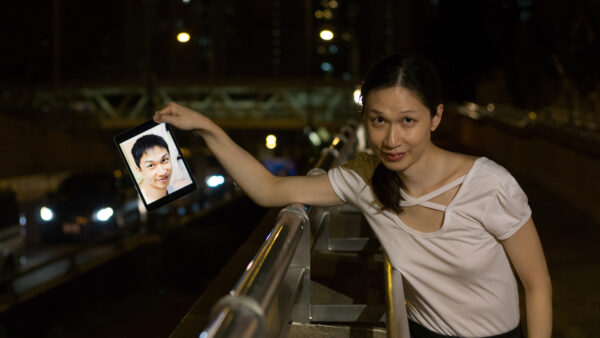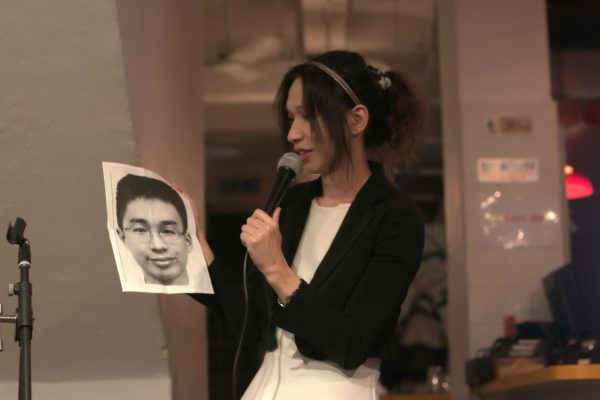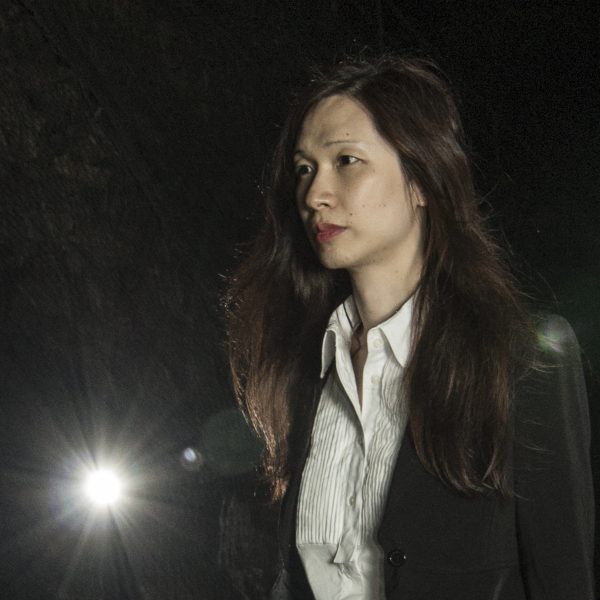Say Hello to Documentary Filmmaker Ms. Beatrice Wong
Her film 'Goodbye Mr. B, Hello Ms. B' is a slice of transgender life. Beatrice Wong talks about making lighthearted films, being out publicly, and gender roles.
'
Goodbye Mr. B, Hello Ms. B' is an autobiographical documentary about director Beatrice Wong’s experiences as a transgender woman. She welcomes us into her childhood and adolescence, her relationship with her mother, and her hopes and aspirations for the future.
She had always wanted to be a filmmaker - getting a degree in filmmaking. But then she had to pay off university loans, so, she got an IT job instead. You know how it goes. This is her first - what she calls - "presentable" film (speaking personally, I'd say it's much more than "presentable"!) and is one of the
35 international shorts competing for this year's Iris Prize.
She talked to me about making lighthearted films, being out publicly, and gender roles!
 You have said that when you talk about transitioning, you don’t like to be serious. You prefer it to be more humorous instead. Why is that important to you?
You have said that when you talk about transitioning, you don’t like to be serious. You prefer it to be more humorous instead. Why is that important to you?
I am a person who likes to smile a lot. I like to deal with things in a very lighthearted manner. Going through transitioning and laughing about it helps me overcome the difficulties. And I like to joke about myself.
Also, it gets a bit tiring if, in mainstream media, LGBT+ stories are always sad and serious. It’s nice to have narratives that are a bit different.
Yeah, that’s part of why I chose my approach. I think my documentary stands out because I try to bring joy to the audience instead of presenting myself as a victim of discrimination or abuse. I do have unhappy experiences, but I don’t think they are significant when compared to what I have achieved.
Yeah, definitely. That’s also a more hopeful approach.
Yeah! I recently made a
short film about my relationship with my girlfriend. But it wasn’t received that well because again, it is very light-hearted. It’s a very relaxed short. The reception wasn’t as good as it is for other shorts that tackle the subject of same-sex love. Because in Hong Kong, people tend to focus on the fact that two women are in love but they cannot marry. But I don’t want to talk about those things.
Recently, the government has organised a consultation to investigate the possibility of changing the law, so that we can have a Gender Recognition Act (to be allowed to obtain a corrected birth certificate).
Oh, that’s great!
Yeah, but I have been to some meetings and there are a lot of opposing groups, especially Christian ones. Even though I try to stay away from politics, in the end, I don’t think I can. I have been able to undergo a fairly successful transition, but I know people who are suffering. I feel that there is a sort of responsibility to speak up. So, for my next film I want to explore these political themes.
 So, do you put yourself in the public eye to have more representation for transgender people?
So, do you put yourself in the public eye to have more representation for transgender people?
I have mixed feelings about it. Even though I’m very comfortable talking about my past, some of my transgender sisters want to erase theirs. Because I have been on the news and raised the profile of transgender people, it has become a bit difficult for them. People are curious about who else might be transgender in my circles. So, it feels like I’m endangering them.
But what about yourself, why are you so open to talking about your past?
I want more people to know what transgender people go through. Also, openly talking about it helps me overcome the fears I had while transitioning. I would feel quite strongly that I won’t qualify as a woman. For example, I don’t speak in a very feminine way. But after I started talking about these things and got some exposure, I found that people are quite accepting. It gives me the courage to carry on. It is a little bit like a litmus test.
Yeah! I mean, cisgender women have been fighting so long to not be put into that box of only talking or looking a certain way. So, those rules shouldn’t be there for transgender women either, right? But I guess society sees trans women as not woman enough, so there is that pressure to be more feminine.
That is a really good point. At first, I thought I need to follow those rules, but now I don’t believe that anymore. I don’t care about whether I am feminine enough or not. But I think different transgender people have different experiences and goals. So, some of my sisters do want to be that perfect woman. As for me, I don’t want to remind myself to be a certain way 24/7 - but in certain situations, I do feel more self-conscious. But I don’t believe that women – whether cisgender or transgender – need to act a certain way. For me, an attractive woman is actually someone who blurs the boundaries. I like people who don’t set limits for themselves in terms of what they should and shouldn’t do.

'Goodbye Mr. B, Hello Ms. B' will be showing as part of the
Iris Prize Shorts Programme 7.
 You have said that when you talk about transitioning, you don’t like to be serious. You prefer it to be more humorous instead. Why is that important to you?
I am a person who likes to smile a lot. I like to deal with things in a very lighthearted manner. Going through transitioning and laughing about it helps me overcome the difficulties. And I like to joke about myself.
Also, it gets a bit tiring if, in mainstream media, LGBT+ stories are always sad and serious. It’s nice to have narratives that are a bit different.
Yeah, that’s part of why I chose my approach. I think my documentary stands out because I try to bring joy to the audience instead of presenting myself as a victim of discrimination or abuse. I do have unhappy experiences, but I don’t think they are significant when compared to what I have achieved.
Yeah, definitely. That’s also a more hopeful approach.
Yeah! I recently made a short film about my relationship with my girlfriend. But it wasn’t received that well because again, it is very light-hearted. It’s a very relaxed short. The reception wasn’t as good as it is for other shorts that tackle the subject of same-sex love. Because in Hong Kong, people tend to focus on the fact that two women are in love but they cannot marry. But I don’t want to talk about those things.
Recently, the government has organised a consultation to investigate the possibility of changing the law, so that we can have a Gender Recognition Act (to be allowed to obtain a corrected birth certificate).
Oh, that’s great!
Yeah, but I have been to some meetings and there are a lot of opposing groups, especially Christian ones. Even though I try to stay away from politics, in the end, I don’t think I can. I have been able to undergo a fairly successful transition, but I know people who are suffering. I feel that there is a sort of responsibility to speak up. So, for my next film I want to explore these political themes.
You have said that when you talk about transitioning, you don’t like to be serious. You prefer it to be more humorous instead. Why is that important to you?
I am a person who likes to smile a lot. I like to deal with things in a very lighthearted manner. Going through transitioning and laughing about it helps me overcome the difficulties. And I like to joke about myself.
Also, it gets a bit tiring if, in mainstream media, LGBT+ stories are always sad and serious. It’s nice to have narratives that are a bit different.
Yeah, that’s part of why I chose my approach. I think my documentary stands out because I try to bring joy to the audience instead of presenting myself as a victim of discrimination or abuse. I do have unhappy experiences, but I don’t think they are significant when compared to what I have achieved.
Yeah, definitely. That’s also a more hopeful approach.
Yeah! I recently made a short film about my relationship with my girlfriend. But it wasn’t received that well because again, it is very light-hearted. It’s a very relaxed short. The reception wasn’t as good as it is for other shorts that tackle the subject of same-sex love. Because in Hong Kong, people tend to focus on the fact that two women are in love but they cannot marry. But I don’t want to talk about those things.
Recently, the government has organised a consultation to investigate the possibility of changing the law, so that we can have a Gender Recognition Act (to be allowed to obtain a corrected birth certificate).
Oh, that’s great!
Yeah, but I have been to some meetings and there are a lot of opposing groups, especially Christian ones. Even though I try to stay away from politics, in the end, I don’t think I can. I have been able to undergo a fairly successful transition, but I know people who are suffering. I feel that there is a sort of responsibility to speak up. So, for my next film I want to explore these political themes.
 So, do you put yourself in the public eye to have more representation for transgender people?
I have mixed feelings about it. Even though I’m very comfortable talking about my past, some of my transgender sisters want to erase theirs. Because I have been on the news and raised the profile of transgender people, it has become a bit difficult for them. People are curious about who else might be transgender in my circles. So, it feels like I’m endangering them.
But what about yourself, why are you so open to talking about your past?
I want more people to know what transgender people go through. Also, openly talking about it helps me overcome the fears I had while transitioning. I would feel quite strongly that I won’t qualify as a woman. For example, I don’t speak in a very feminine way. But after I started talking about these things and got some exposure, I found that people are quite accepting. It gives me the courage to carry on. It is a little bit like a litmus test.
Yeah! I mean, cisgender women have been fighting so long to not be put into that box of only talking or looking a certain way. So, those rules shouldn’t be there for transgender women either, right? But I guess society sees trans women as not woman enough, so there is that pressure to be more feminine.
That is a really good point. At first, I thought I need to follow those rules, but now I don’t believe that anymore. I don’t care about whether I am feminine enough or not. But I think different transgender people have different experiences and goals. So, some of my sisters do want to be that perfect woman. As for me, I don’t want to remind myself to be a certain way 24/7 - but in certain situations, I do feel more self-conscious. But I don’t believe that women – whether cisgender or transgender – need to act a certain way. For me, an attractive woman is actually someone who blurs the boundaries. I like people who don’t set limits for themselves in terms of what they should and shouldn’t do.
So, do you put yourself in the public eye to have more representation for transgender people?
I have mixed feelings about it. Even though I’m very comfortable talking about my past, some of my transgender sisters want to erase theirs. Because I have been on the news and raised the profile of transgender people, it has become a bit difficult for them. People are curious about who else might be transgender in my circles. So, it feels like I’m endangering them.
But what about yourself, why are you so open to talking about your past?
I want more people to know what transgender people go through. Also, openly talking about it helps me overcome the fears I had while transitioning. I would feel quite strongly that I won’t qualify as a woman. For example, I don’t speak in a very feminine way. But after I started talking about these things and got some exposure, I found that people are quite accepting. It gives me the courage to carry on. It is a little bit like a litmus test.
Yeah! I mean, cisgender women have been fighting so long to not be put into that box of only talking or looking a certain way. So, those rules shouldn’t be there for transgender women either, right? But I guess society sees trans women as not woman enough, so there is that pressure to be more feminine.
That is a really good point. At first, I thought I need to follow those rules, but now I don’t believe that anymore. I don’t care about whether I am feminine enough or not. But I think different transgender people have different experiences and goals. So, some of my sisters do want to be that perfect woman. As for me, I don’t want to remind myself to be a certain way 24/7 - but in certain situations, I do feel more self-conscious. But I don’t believe that women – whether cisgender or transgender – need to act a certain way. For me, an attractive woman is actually someone who blurs the boundaries. I like people who don’t set limits for themselves in terms of what they should and shouldn’t do.
 'Goodbye Mr. B, Hello Ms. B' will be showing as part of the Iris Prize Shorts Programme 7.
'Goodbye Mr. B, Hello Ms. B' will be showing as part of the Iris Prize Shorts Programme 7. 
